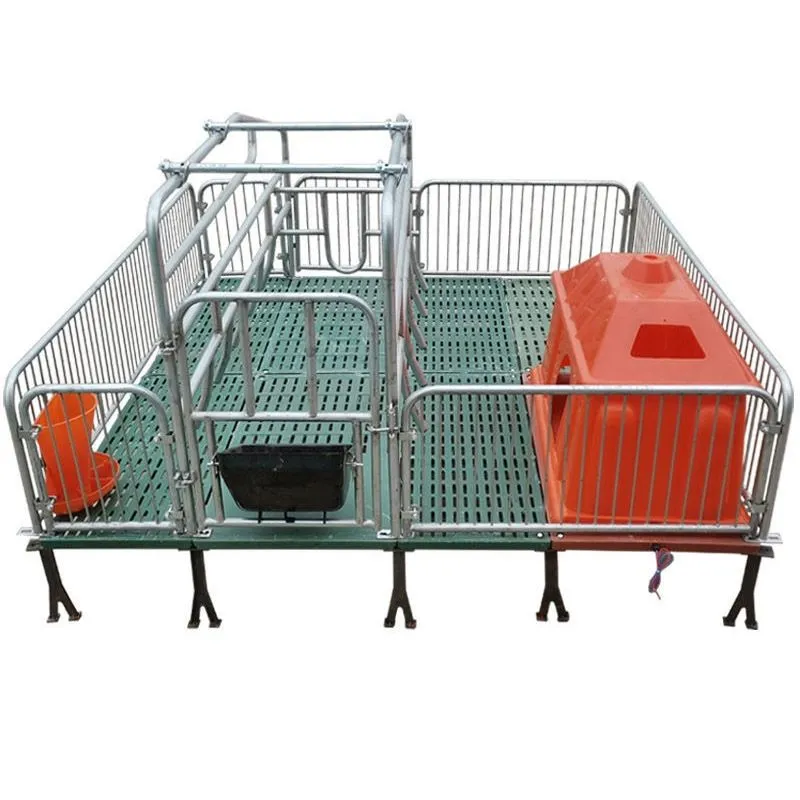Mobile Pig Pens and Urban Farming
Mar . 21, 2025 13:51 Bwererani ku mndandanda
Mobile Pig Pens and Urban Farming
The rise of urban farming has led to new discussions about the feasibility of raising pigs in city environments. Mobile pig pens are a practical solution, allowing urban farmers to house pigs in confined spaces and relocate them as needed, making the most of limited land. These pens are designed to be portable, enabling farmers to rotate their pigs through different grazing areas, improving land use and minimizing overgrazing in urban settings. However, urban farming with pigs faces specific challenges, particularly zoning laws and community perceptions that need careful consideration.

Zoning laws in many urban areas often prohibit livestock farming within city limits, especially when it comes to larger animals like pigs. To combat this, mobile pig pens provide a flexible alternative, allowing farmers to house pigs temporarily in designated zones or private properties. With careful planning, mobile pens could be strategically placed to comply with local regulations while supporting the sustainability of urban agriculture.
Pig Pens: Understanding Zoning Laws for Pig Farming in Cities
Urban zoning laws are one of the most significant barriers to raising pigs in cities. Many municipalities restrict livestock farming due to concerns about noise, odor, and space requirements. The introduction of pig pens in urban areas can be subject to specific zoning regulations, often requiring permits or adherence to animal welfare standards.
However, mobile pig pens present an opportunity for urban farmers to work within these restrictions. By using portable, confined spaces that can be easily relocated, farmers may be able to comply with zoning laws while promoting urban agriculture. For example, pig breeding pens could be temporarily placed on unused plots of land, reducing the long-term commitment of establishing permanent farming structures. With the right permits and adherence to local laws, mobile pig pens may open up possibilities for urban farms that benefit both the community and the environment.
Pen for Pigs: Community Perceptions of Urban Pig Farming
Community perceptions of urban pig farming can vary widely. While some may embrace it for its potential to promote local food production and sustainability, others may view a pen for pigs as an unwelcome addition to an urban neighborhood. Concerns about noise, smell, and the overall aesthetics of having pigs nearby often dominate public discussion.
To address these concerns, pig penning practices need to be carefully managed. The design of mobile pig pens can play a significant role in minimizing environmental impacts. Well-ventilated pens with odor-reducing features and proper waste management systems can help mitigate negative perceptions. Additionally, educating the community about the benefits of urban pig farming, such as waste reduction and organic fertilizer production, can help improve acceptance. Farmers could also ensure their operations are discreet, with pens placed in areas where they won’t disrupt residential areas, such as vacant lots or community garden spaces.
The Role of Mobile Pig Pens in Sustainable Urban Farming
One of the main benefits of mobile pig pens in urban settings is their contribution to sustainability. By providing a means for small-scale farmers to raise pigs in urban areas, these pens reduce the need for large-scale factory farming, lower the carbon footprint of food production, and promote local food sourcing. The ability to rotate pigs between different areas also allows for more sustainable land management practices, as pig penning can help improve soil fertility and reduce waste accumulation in urban environments.
Moreover, mobile pig pens are an essential component in implementing rotational grazing in urban farming. This technique allows farmers to use smaller plots of land more efficiently by regularly moving pigs, reducing overgrazing, and ensuring soil health. As cities continue to expand and more people look for sustainable food sources, these pens offer a valuable tool for urban farmers to meet the growing demand for locally-produced, sustainable meat.
Despite the hurdles posed by zoning laws and community concerns, there is potential for pig breeding pens and a pen for pigs to thrive in urban environments. Through careful planning, community outreach, and adherence to regulations, urban pig farming could play a significant role in improving local food systems. Mobile pig pens allow farmers to maintain a flexible, efficient, and sustainable farming practice, creating a win-win scenario for both the community and the environment.
The future of urban pig farming may see further advancements in pig penning technology, including more automated systems for feeding, waste management, and waste-to-energy conversion. As urban agriculture continues to evolve, it is likely that cities will adapt their zoning laws to accommodate more sustainable, localized food production. Additionally, with growing support for sustainable farming and food security, mobile pig pens may become an increasingly viable option for urban farmers who seek to bring pigs back into the city and address the challenges of modern food systems.
Mobile pig pens offer a practical solution to some of the challenges faced by urban farmers, especially when it comes to overcoming zoning laws and community concerns. With careful management, education, and the use of efficient pen designs, urban pig farming can become an important component of sustainable agriculture in cities. Pig penning, through the use of mobile pens, contributes to improved land use, reduces environmental impact, and can help address local food needs. As the urban farming movement continues to grow, the potential for pig breeding pens and a pen for pigs in city environments is promising, provided that urban farmers take a proactive approach to overcoming challenges and building positive relationships with their communities.
-
Evisceration Table - Hygienic, Stainless Steel, Easy-Clean
NkhaniNov.17,2025
-
Chicken Plucker and Scalder | Fast, Stainless, Adjustable
NkhaniNov.17,2025
-
Silo Solutions: Durable, Automated, Batching-Ready Storage
NkhaniNov.17,2025
-
Automatic Drinking Line for Poultry | Precise & Durable
NkhaniNov.17,2025
-
Cutting Machine for Meat & Bone | High-Precision, Safe
NkhaniNov.17,2025
-
Chicken Feet Peeling Machine | Fast, Hygienic, High-Yield
NkhaniNov.10,2025






